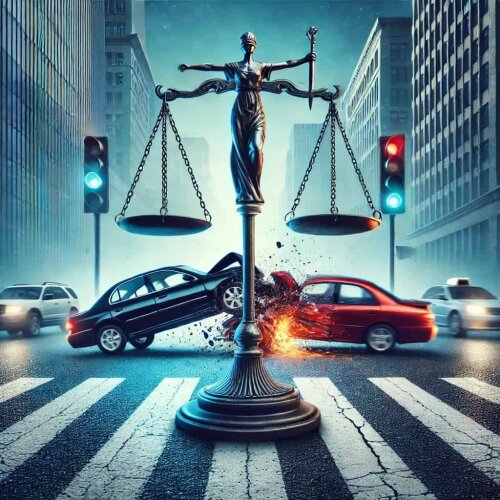Best Car Accident Lawyers in Portland
Share your needs with us, get contacted by law firms.
Free. Takes 2 min.
List of the best lawyers in Portland, United States
About Car Accident Law in Portland, United States
This guide describes how car accident claims generally work in Portland, Oregon. When a crash happens, questions arise about fault, insurance coverage, medical care, and property damage. Oregon follows a fault-based system for auto accidents, which means the driver who caused the crash is generally responsible for paying for damages through their insurance or personal assets. Portland has a mix of vehicle, bicycle, transit and pedestrian traffic, so many crashes involve multiple road users and overlapping legal issues. This guide is informational and does not replace personalized legal advice.
Why You May Need a Lawyer
Not every car accident requires an attorney, but legal help can be important in many situations. You may need a lawyer if your injuries are serious or long-lasting, if fault is disputed, if the insurance company denies or undervalues your claim, or if the at-fault driver is uninsured or underinsured. Lawyers also help when multiple parties are involved, when commercial vehicles are at fault, when a hit-and-run occurs, or when there are complex liability issues like defective parts or dangerous road conditions.
A lawyer can explain your legal rights, gather and preserve evidence, negotiate with insurers, calculate full damages including future medical costs and lost income, and represent you in court if settlement is not possible. Attorneys often work on a contingency-fee basis for personal injury claims, so you generally pay only if they recover money for you.
Local Laws Overview
Key legal concepts and local rules that affect car accident claims in Portland include the following.
Fault-based insurance system - Oregon uses a fault-based approach. The at-fault driver or their insurer is typically responsible for compensating victims for bodily injury and property damage.
Comparative fault - Oregon reduces a claimant's recovery by their percentage of fault. If you are partially to blame, the total recovery is reduced to reflect your share of responsibility.
Insurance requirements - Oregon requires drivers to carry liability insurance. Minimum coverages and specific rules change from time to time, so check current requirements with the Motor Vehicle Division or an insurance professional.
Statute of limitations - In most personal injury cases arising from car crashes in Oregon, you must file a lawsuit within a limited time period. Typically this period is two years from the date of the crash, so it is important to act promptly to preserve your rights.
Police and crash reports - If there are injuries, serious property damage, or criminal conduct, call 911 and obtain a police report. Police reports and crash reports can be important evidence for insurers and courts.
Distracted and impaired driving - Oregon law prohibits texting while driving for all drivers and has laws against other forms of distracted driving. Driving under the influence of alcohol or drugs is a criminal offense and can strengthen a civil claim for damages.
Bicycle and pedestrian considerations - Portland has a high volume of bicyclists and pedestrians. Local and state laws protect vulnerable road users and can affect how fault is determined in collisions involving bikes or pedestrians.
Frequently Asked Questions
What should I do immediately after a car accident in Portland?
Ensure safety first - move out of traffic if it is safe to do so and call 911 if anyone is injured. Exchange contact, insurance and vehicle information with the other driver(s). Take photos of the scene, vehicle damage, license plates, traffic signs, road conditions and any visible injuries. Get names and contact information for witnesses. Seek medical attention even if injuries seem minor. Report the crash to police if required and follow any crash-reporting requirements specified by local authorities or your insurer.
Do I have to report the accident to the police or to the DMV?
If there are injuries, deaths, or significant property damage, you should call law enforcement to report the crash. Certain crashes also require a crash report for the Motor Vehicle Division or local authorities. Even when a police report is not mandatory, obtaining one can help with insurance claims and any later legal action. Check with local authorities or an attorney if you are unsure about filing requirements.
How is fault determined after a crash?
Fault is determined by reviewing evidence such as police reports, witness statements, photos, traffic camera or dashcam video, vehicle damage patterns, and expert analysis if needed. Insurance adjusters make initial fault determinations, but those findings can be challenged. If fault is disputed, it may be resolved through negotiation, mediation, or litigation where a court or jury assigns percentages of responsibility.
What types of damages can I recover?
You may be able to recover economic damages such as medical expenses, lost wages, and repair or replacement of your vehicle. Non-economic damages may include pain and suffering, emotional distress and loss of enjoyment of life. In rare cases involving particularly egregious conduct, punitive damages may be available. A lawyer can help estimate both immediate and future damages, such as ongoing medical care or reduced earning capacity.
What if the at-fault driver has no insurance or not enough insurance?
If the at-fault driver is uninsured or underinsured, your own insurance policy may provide coverage if you carry uninsured/underinsured motorist (UM/UIM) coverage. UM/UIM helps cover your expenses when the other driver cannot pay. If you do not have UM/UIM coverage, recovery options may include pursuing the at-fault driver personally, but collecting from an individual with limited assets can be difficult.
What if the other driver flees the scene - a hit-and-run?
Report a hit-and-run to the police immediately and provide any details you can, such as direction of travel, partial plate number, vehicle description or video. If you have UM coverage, you may be able to file a claim even without identifying the other driver. Prompt police action can increase the chances of identifying a fleeing driver.
When should I hire a lawyer after a car accident?
Consider hiring a lawyer early if you have serious injuries, disputed fault, complex medical issues, large or unclear insurance coverage, claims involving commercial vehicles, or if the insurer is making a low settlement offer. You can often consult with an attorney for a free or low-cost initial evaluation to determine whether legal representation would be helpful.
How much does a car accident lawyer cost?
Many personal injury attorneys work on a contingency-fee basis - the lawyer is paid a percentage of the settlement or judgment, and you pay nothing upfront for legal fees. You may still be responsible for certain case expenses, but an attorney will explain fee arrangements and costs in a written agreement before proceeding.
Should I accept the first settlement offer from the insurance company?
Insurance companies may make quick offers to close claims for less than full value. Do not sign releases or accept settlement offers until you understand the full extent of your injuries and future needs. Consult an attorney before accepting an offer that may not cover future medical costs or lost earnings.
How long will my claim or case take?
Timelines vary depending on the complexity of the case, severity of injuries, willingness of insurers to negotiate and whether litigation is necessary. Some claims settle in weeks to months, while others involving significant injuries or disputed liability can take a year or more. Early medical care and timely documentation help move claims along.
Additional Resources
Portland Police Bureau - for filing reports and contacting traffic investigators.
Portland Bureau of Transportation - information about local road conditions, traffic engineering and pedestrian or bicycle infrastructure.
Oregon Driver and Motor Vehicle Division - information on insurance requirements and crash reporting obligations.
Oregon Department of Transportation - statewide traffic safety and crash data resources.
Oregon State Bar - resources for finding and evaluating attorneys and understanding attorney-client responsibilities.
Legal aid organizations and local attorney referral services - for people who may need low-cost or pro bono legal assistance.
Oregon Trial Lawyers Association and other professional groups - for general information about civil litigation and consumer protections.
Next Steps
If you were involved in a crash and need legal assistance, consider the following steps.
1. Seek prompt medical attention - Document all injuries and follow your healthcare provider's advice. Medical records are critical evidence.
2. Preserve evidence - Keep photos, videos, repair estimates, medical bills, receipts, correspondence with insurers and any witness information.
3. File required reports - Report the crash to law enforcement and follow any state or local crash-reporting requirements.
4. Notify your insurance company - Report the claim to your insurer, but give brief factual information only. Avoid admitting fault or giving recorded statements without speaking to an attorney.
5. Consult an attorney - Arrange a consultation with a car-accident attorney to evaluate your claim. Bring records including the police report, medical bills, photos, and insurance information.
6. Understand timelines and fees - Ask about the statute of limitations, likely timelines, fee structures and whether the attorney works on contingency.
7. Stay organized and communicate - Keep a folder of all documents, track medical appointments and expenses, and inform your attorney about new information promptly.
Finally, remember that this guide is for general informational purposes and does not create an attorney-client relationship. For advice tailored to your situation, consult a qualified lawyer licensed in Oregon who practices in car accident and personal injury law.
Lawzana helps you find the best lawyers and law firms in Portland through a curated and pre-screened list of qualified legal professionals. Our platform offers rankings and detailed profiles of attorneys and law firms, allowing you to compare based on practice areas, including Car Accident, experience, and client feedback.
Each profile includes a description of the firm's areas of practice, client reviews, team members and partners, year of establishment, spoken languages, office locations, contact information, social media presence, and any published articles or resources. Most firms on our platform speak English and are experienced in both local and international legal matters.
Get a quote from top-rated law firms in Portland, United States — quickly, securely, and without unnecessary hassle.
Disclaimer:
The information provided on this page is for general informational purposes only and does not constitute legal advice. While we strive to ensure the accuracy and relevance of the content, legal information may change over time, and interpretations of the law can vary. You should always consult with a qualified legal professional for advice specific to your situation.
We disclaim all liability for actions taken or not taken based on the content of this page. If you believe any information is incorrect or outdated, please contact us, and we will review and update it where appropriate.










